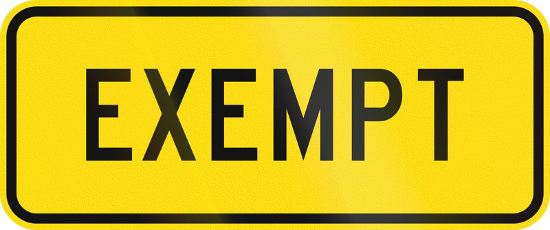
The California Professional Exemption Explained
06 Oct 2017
Are you aware of the rules used to classify an employee as an exempt professional under California law?
Unlike the more strictly quantitative outside sales exemption salary basis test, California’s professional exemption relies on numerous tests, connected to both job description and salary.
It is essential to understand exactly what these standards and tests mean to avoid misclassification by your employer. Under standards established in California’s Wage Orders, an exempt professional must be:
- A person licensed or certified by the State of California and “primarily” engaged in the practice of one of the following recognized professions: law, medicine, dentistry, optometry, architecture, engineering, teaching or accounting OR Primarily engaged in an occupation commonly recognized as a learned or artistic profession; If any employee fits within either of these two categories, they must ALSO:
- Customarily and regularly exercise discretion and independent judgment in the performance their duties; AND
- be paid on a salary basis and earn a monthly salary equivalent to at least twice the state minimum wage for full-time employment.
The following guide will break down these tests one by one to provide you with a better understanding of whether or not a particular position can be considered an exempt professional.
What Rights are Employees Exempted From?
Any California employee meeting the established definition of exempt professional is exempt from:
- California state minimum wage laws.
- Laws requiring employers to provide their employees with overtime pay.
- Laws requiring employers to provide their employees with rest and meal breaks.
For a better understanding of these laws and how they apply to the various categories of exempt and non-exempt employee, please see the article on exempt California employees.
What Are The tests?
The process of classifying an employee as an exempt professional is broken into three tests: minimum salary requirement, job description, and job duties.
Minimum Salary Requirement
An exempt professional employee must both “be paid on a salary basis” and earn a monthly salary of “at least twice the state minimum wage for full-time employment,” If any part of this condition is not fulfilled, the employee must be considered nonexempt.
“Be Paid On A Salary Basis”
An employee paid on a salary basis is one who receives a fixed minimum payment of wages independent of hours worked or quality of work. Employees who are paid on an hourly basis or employees who are paid by individual commission cannot be considered exempt professionals.
“At Least Twice The state Minimum Wage”
To be considered an exempt professional, an employee’s monthly salary must equal at least twice California’s minimum wage for full-time work. California classifies “full time work” as 40 hours per week.
For 2019 calendar year that number should be $45,760 per year while working for small employers (25 employees or less) or $49,920 per year while working for large employers (26 employees or more).
When calculating an employee’s salary to determine exempt status, monthly salary must be used even if the employer utilizes a two-week or other non-monthly payment period.
Unpaid full vacation days taken by the employee may be deducted by the employer when calculating salary without affecting exempt status. Unpaid partial vacation days may not be deducted. Deducting such days classifies the employee as paid hourly and therefore non-exempt.
Licensed/Certified OR Primarily Engaged In Learned/Artistic Profession
To meet the professional exemption standards, an employee must be licensed or certified in a recognized profession or be primarily engaged in a learned or artistic profession. Only one of these standards must be met for the employee to be considered exempt.
“Licensed or certified in a recognized profession”
Pursuant to California labor law, the recognized professions for exempt professionals are law, medicine, dentistry, optometry, architecture, engineering, teaching, and accounting.
Over half of the employee’s duties must consist of work directly related to the recognized profession. For example, a licensed lawyer who spends two days per week advising younger lawyers in a law office and three days working as a secretary would be considered nonexempt.
The employee must in most cases be licensed or certified by the state of California in that profession. Exceptions to this rule are listed below:
Law Clerks:
In Zelasko-Barrett v. Brayton-Purcell, LLP, California’s First District Court of Appeal held that an unlicensed law clerk was exempt. The law clerk in question had attended law school, had graduated, but had not yet passed the bar exam. The court held that the law clerk also met the other two requirements – job duties (in particular the clerk performed work similar to a junior attorney i.e. prepared discovery demands and responses, conducted legal research, drafted legal memoranda, etc.) and minimum salary – for the learned professional exemption (discussed in detail below).
It should also be noted that the extent of the law clerk’s education was closely considered by the courts in determining his exempt status. When determining status in the absence of a license or certification, the court operates on a case-by-case basis.
For example, a paralegal with a two-year associate’s degree working full time at a law office could not be considered an exempt professional regardless of job duties or salary.
Accountants:
A similar case, Campbell v. Price Waterhouse Coopers, ruled that unlicensed accountants could still be considered exempt professionals. As in Zelasko-Barrett, the employee’s education and job duties were deemed sufficient to meet exemption standards regardless of the presence or absence of a license.
Pharmacists:

Pharmacists do not qualify as exempt professionals regardless of license or job duties. They can, however, be exempt if they meet the test for executive or administrative exemption.
Depending on the nature of their work, pharmacists may be regulated either by Wage Order No. 7-2001 (mercantile industry), or Wage order 2-2001 (professional technical, mechanical, healthcare industry).
Registered Nurses:

Registered nurses in most cases are also considered nonexempt employees, unless they meet the tests for administrative or executive exemption. Some exceptions apply. More specifically, the professional exemption may be applied to those that are are advanced practice nurses, which are exempt and defined as one of the following:
•Certified nurse midwife
•Certified nurse anesthetist
•Certified nurse practitioner
Public School Teachers:
Teaching is considered one of the recognized professionals for exemption. However, California courts have ruled that in order to be considered exempt, a teacher must be teach at “an accredited college or university.”
Teachers at trade and vocational schools qualify for exemption, as decided by California School of Culinary Arts v. Lujan. However, the trade school in question must either have been accredited by an organization recognized by the United States Secretary of Education or been approved by the California Bureau for Private Post-secondary & Vocational Education.
Private School Teachers:
Teachers employed at private schools below the university level (kindergarten – 12th grade, or k-12) are classified as exempt professionals if they both meet the minimum salary requirement and hold either:
•A bachelor’s degree (or higher) from an accredited institution of higher learning
•A teaching credential issued by any state in the United States
Tutors, teaching assistants and day care providers do not qualify as exempt even if employed at private schools.
Physicians & Surgeons:
Normally, physicians and surgeons would not be considered exempt professionals due to receiving hourly wages. However, a physician or surgeon can be considered exempt if:
•They have a medical license
•They spend over half their work time engaged in duties requiring a medical license
•Receive an hourly rate of pay of at least $82.72 (as of January 1, 2019)
Learned or Artistic Profession
In addition to the exceptions stated above, an employee can qualify as exempt if they are “primarily engaged in an occupation commonly recognized as a learned or artistic profession
Learned Professional
A learned professional is any employee who:
•Works in a field of science or learning requiring advanced or extended study
•Has completed advanced or extended study in that field (usually considered to be a bachelor’s degree or above)
Common examples of learned professionals include: chemists, biologists, physicists and other employees trained in the advanced sciences.
Whether or not an employee is considered a learned professional is determined on a case-by-case basis relying closely on the job duties standard as described later in this article.
Artistic Professional
An artistic professional is defined by California law as an employee who performs work that is “original and creative.”
This primarily refers to employees in the fields of music, writing, acting, and the graphic arts. Reproducing the creative work of others or producing work that is repetitive and standardized does not qualify one as an artistic professional.
Examples of employees who would be considered exempt artistic professionals include actors, novelists, painters and musicians. Examples of employees who would not be considered such include photo retouchers and animators.
Customarily and Regularly Exercise Discretion & Independent Judgment
The last and most qualitative standard for exempt professionals is that they must perform job duties which “customarily and regularly exercise discretion and independent judgment.”
This disqualifies employees in the otherwise exempt fields who perform tasks that are manual, repetitive, or otherwise do not require individual independent judgment.
For example, an employee with a bachelor’s degree working in a chemistry lab researching new medicines would be considered an exempt professional. An employee with the same degree in the same lab who washed equipment and cleaned up spills would not meet the standards for professional exemption.
Applying The Test
It is important to note that two out of the three standards for meeting the professional exemption are qualitative and not quantitative, and are thus handled by the courts on a case-by-case basis.
When California state law is in conflict with federal law in regards to determining exempt status, the courts will apply the law which is most beneficial to employees. For example, federal law currently requires a lower minimum salary for professional exemption than California state law. Therefore, in cases determining an employee’s exempt or nonexempt status, California state law is used.
If you believe that you have been misclassified by your employer, contact us for a free consultation.


